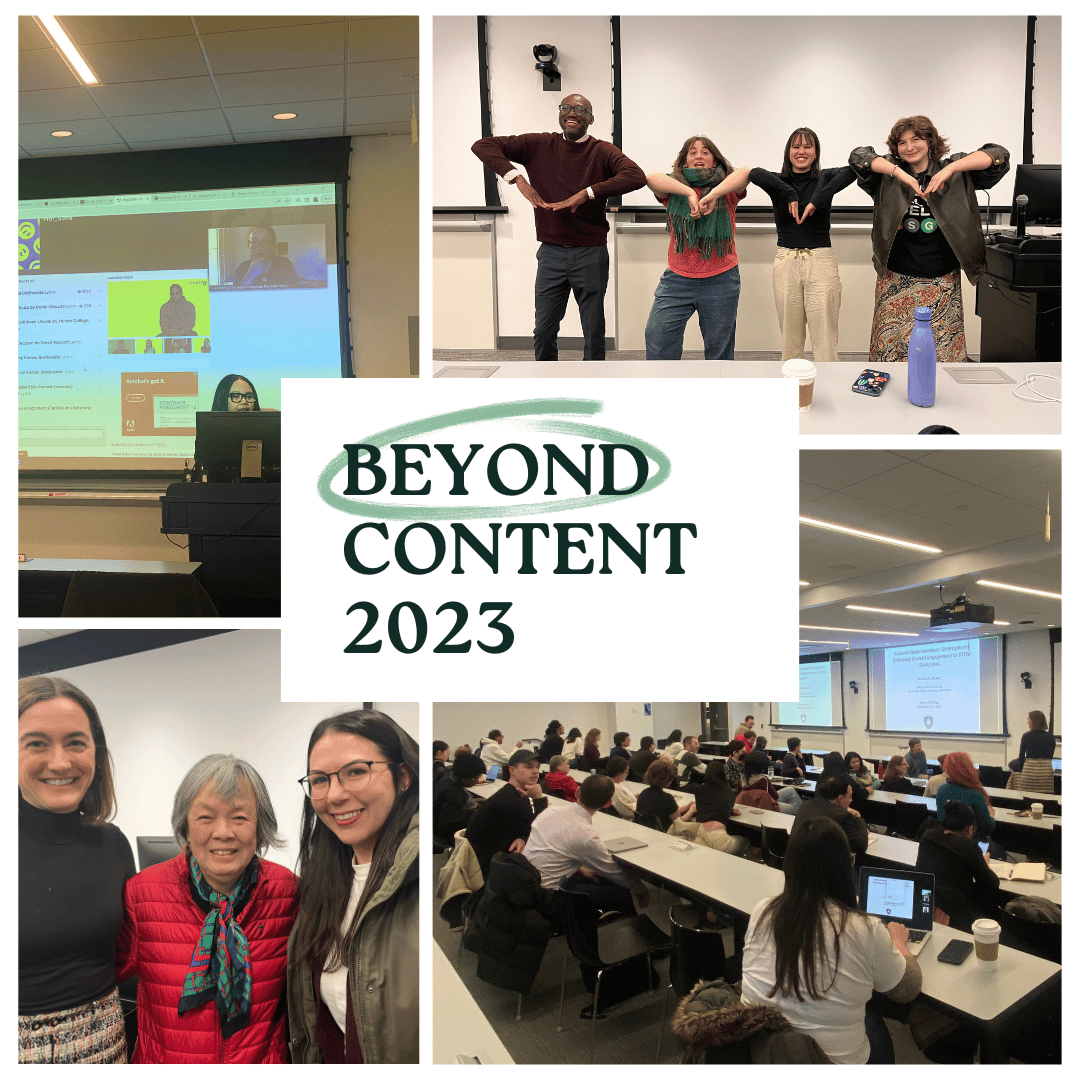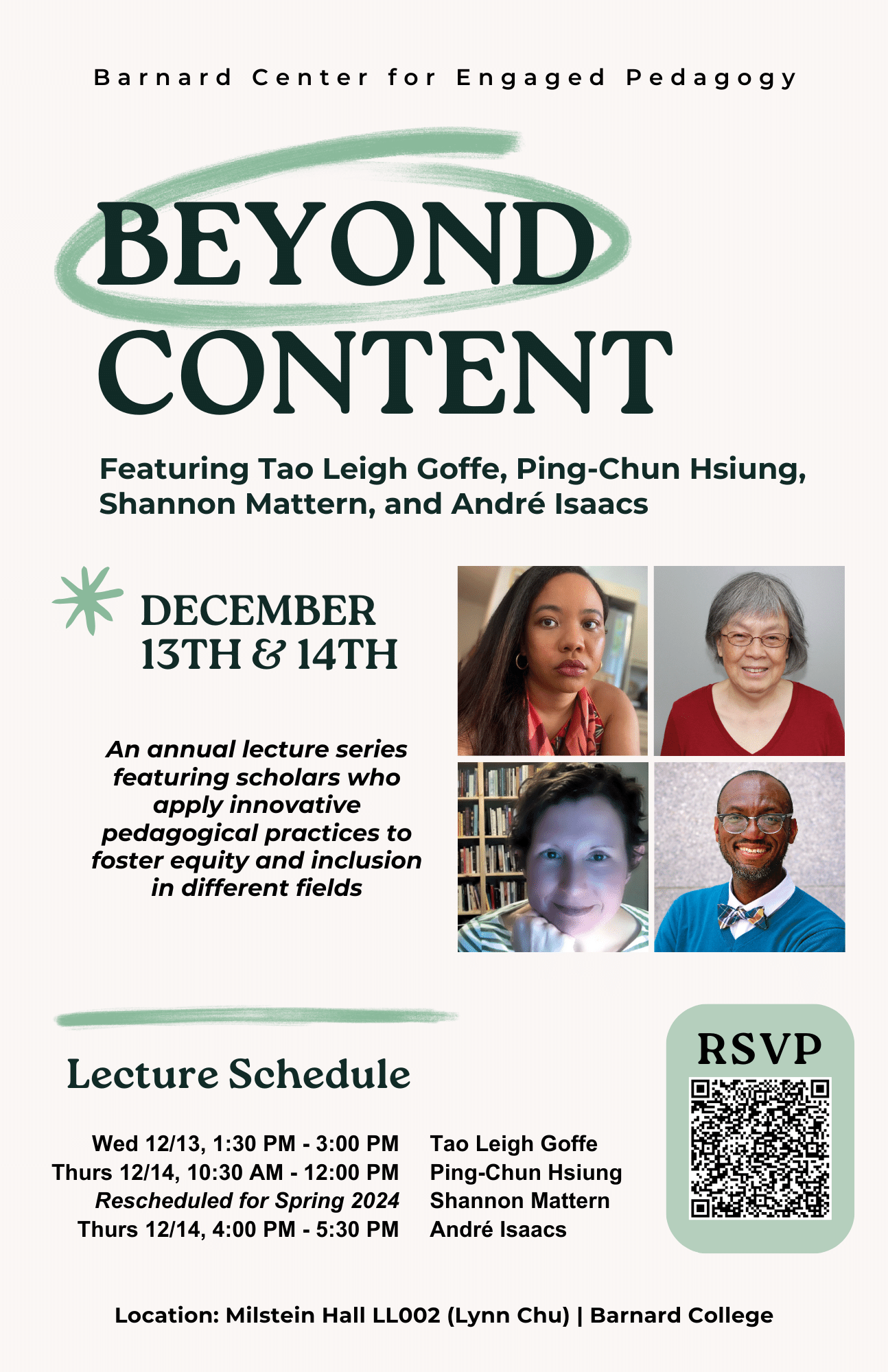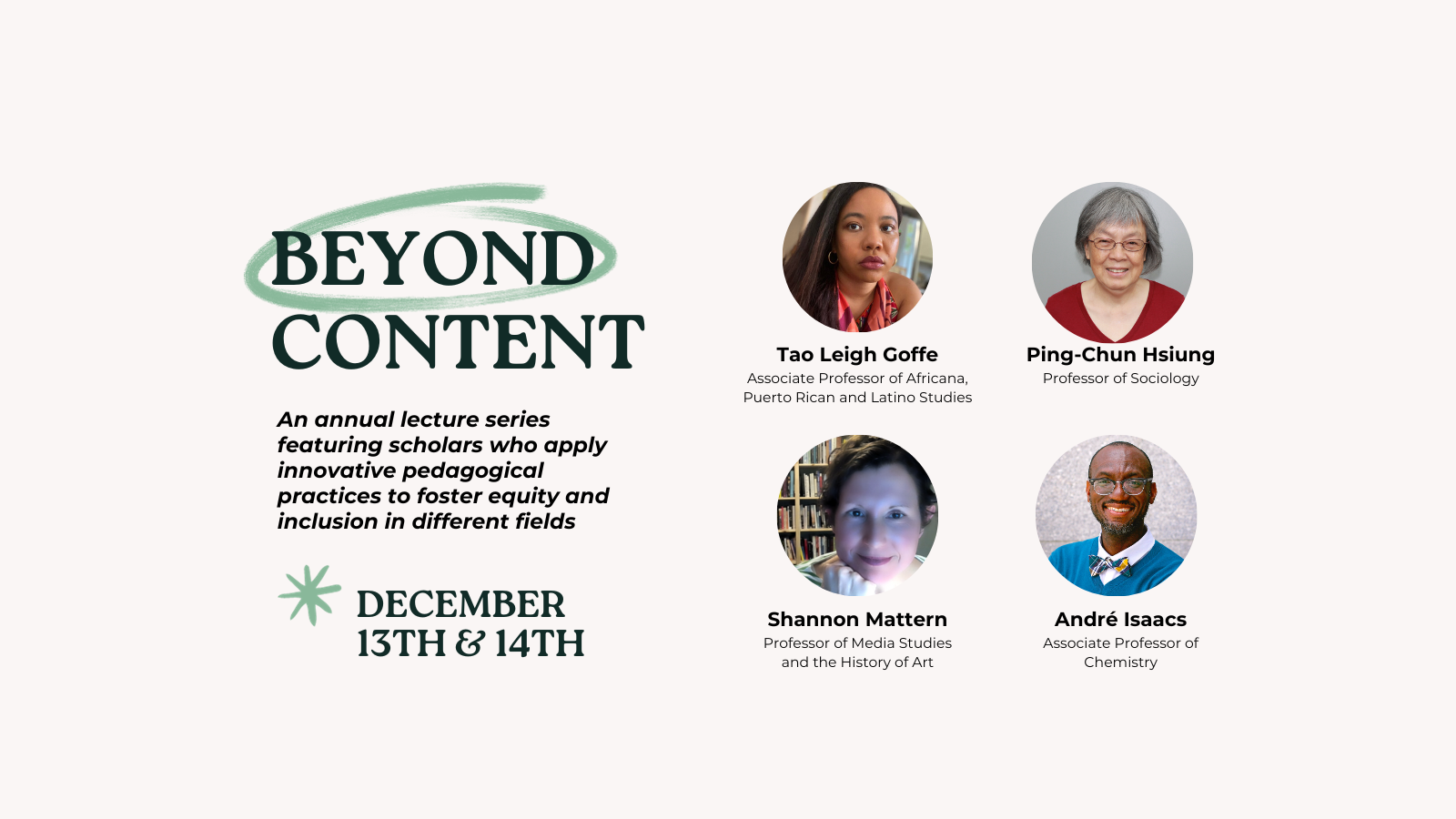Beyond Content 2023
Beyond Content 2023


The Center for Engaged Pedagogy invites you to our 2023 Beyond Content Series: Restructuring Core Courses for Inclusion. This will be a two-day lecture series featuring three scholars who apply innovative pedagogical practices to foster inclusion in three different fields. You can read more about each speaker and lecture below.
Unmapping Through Sound: Digital Humanities and Counter-Cartography Pedagogies
Dr. Tao Leigh Goffe, Associate Professor of Africana, Puerto Rican and Latino Studies, Hunter College
December 13, 2023 from 1:30-3:00 PM
If maps are colonial tools that function to provide information through a visual logic, what potentially becomes undone when sound is used as a primary method of spatial analysis? Challenging the occularcentrism of our society, this presentation explores sonic ways of knowing in the Caribbean and its diaspora. When we begin with sound first, how is wayfinding oriented differently? As opposed to re-mapping and reproducing modes of transparency, we will explore the power of opacity in geographies under colonialism. Touching on the methodologies of Black studies, sound studies, and the digital humanities, an interdisciplinary engagement on sonic data is welcome for discussion.
Tao Leigh Goffe is a London-born, Black British award-winning writer, theorist, and interdisciplinary artist who grew up between the UK and New York. For the past fifteen years she has worked as an academic and has been invited to give keynote lectures in her specialities of colonial histories of race, geology, climate, and media technologies. She is an Associate Professor at Hunter College, CUNY. At present Dr. Goffe is writing a book called AFTER EDEN on how the climate crisis is a racial crisis (Doubleday and Hamish Hamilton (Penguin UK)). Her other book manuscript BLACK CAPITAL, CHINESE DEBT presents a long history of racialiazation, modern finance, and indebtedness that brought together subjects of the Atlantic and Pacific worlds from 1806. Dr. Goffe lives and works in Manhattan where she is an artist-in-residence at Columbia University. Her research explores Black diasporic intellectual histories, political, and ecological life. She is a member of NEW INC, the New Museum’s incubator for art and technology in New York City. She studied English literature at Princeton University before pursuing a PhD at Yale University.
Hearing Silence: Teaching and Studying the Politics of Qualitative Interviews
Dr. Ping-Chun Hsiung, Professor of Sociology, University of Toronto Scarborough
December 14, 2023 from 10:30-12:00 PM
In the context of qualitative interviews, researchers are ready to hear informants' narratives that align with common assumptions, idiosyncratic concepts, or their own theoretical frameworks. Accounts falling outside these pre-existing boundaries become inaudible and overlooked. This presentation regards spoken and unspoken silence as hidden treasures. I will illustrate the strategies I've developed to help students recognize the mechanisms of silencing and hear these silenced accounts. I will also address the challenges related to accessing archival data and engaging with survivors within the historical context of China's Great Leap Forward and Great Famine (1958-1962). I will demonstrate how, despite these obstacles, it is possible to uncover a locally grounded lexicon of discontent through a secondary analysis of survivor interviews. Ultimately, this talk argues that the ability to hear silence is not only indispensable in academic pursuits but also essential in everyday life.
Ping-Chun Hsiung is a dedicated researcher who has conducted extensive ethnographic fieldwork, interviews, and archival research to advance the fields of gender studies and qualitative research, both at local and international levels. Her work is notable for challenging dominant paradigms in the social sciences, as she uncovers, recognizes, and critically analyzes research traditions that deviate from Western norms. With decades of experience in publishing and teaching on qualitative interviewing, Ping-Chun has become an established expert in the field. She has further contributed to the academic community by creating an open-access online resource, Lives & Legacies: A Guide to Qualitative Interviewing, designed to facilitate the teaching and research of qualitative interviews on a global scale.
Cultural Responsiveness: Strategies to Unlocking Student Engagement in STEM
Dr. André Isaacs, Associate Professor of Chemistry, College of the Holy Cross
December 14, 2023 from 4-5:30 PM
STEM educators have long been reluctant to incorporate social issues in their curriculum and mentoring conversations. We deem the field to be one that is deeply technical and objective, leaving no room for integrating the culture of the students we teach. However, it is becoming increasingly difficult for educators to be effective in the classroom if we continue to decouple students’ lived experiences from their academic learning. This talk will focus on modern strategies that capitalize on the unique learning approaches of the younger generation, with special attention to students from historically marginalized groups, to broaden participation in STEM. I will discuss how to incorporate Gen-Z culture in the classroom, tools for students to educate themselves and how to fuse digital media with academic learning.
André Isaacs is an Associate Professor of Chemistry at the College of the Holy Cross in Worcester, MA. He completed his PhD at the University of Pennsylvania and worked as a postdoctoral researcher at the University of California, Berkeley. In addition to teaching courses in Organic Chemistry, he conducts research on the synthesis of N-heterocycles via copper-mediated organic transformations. He uses his social media platform to challenge the normative STEM culture and demonstrate inclusive practices to excite the next generation of scientists, primarily those with marginalized identities.
The Conviviality Covenant: The Loci and Labor of Inclusivity
Dr. Shannon Mattern, Professor of Media Studies and the History of Art, University of Pennsylvania
This talk will be rescheduled for the Spring 2024 Semester.
Just as decolonizing the syllabus involves more than simply including more diverse voices on a reading list, cultivating a convivial, inclusive learning environment requires that we think beyond texts and techniques. In this discussion, we’ll examine myriad sites and situations — from the selection of texts and technology, to group-work and grading, to field trips and office hours — that give us an opportunity to cultivate conviviality, hospitality, and inclusivity, and to recognize such work as an intellectual, administrative, ethical, and creative practice. As we each sketch out our own conviviality covenants, we’ll also think about the labor and resources involved in inclusive pedagogy. Acknowledging that such labor is often unequally distributed and unrecognized, we’ll consider opportunities for mutual aid and systemic transformation.
Shannon Mattern is the Penn Presidential Compact Professor of Media Studies at Art History at the University of Pennsylvania. From 2004 to 2022, she served in the Department of Anthropology and the School of Media Studies at The New School in New York. She has written books about libraries, maps, and urban intelligence; she serves as president of the board of the Metropolitan New York Library Council; and she contributes a column about urban data and mediated spaces to Places Journal. Over the past 23 years she’s taught over 40 different classes and advised over 80 dissertations and theses, and she received The New School’s Distinguished University Teaching Award. You can find her at wordsinspace.net.
